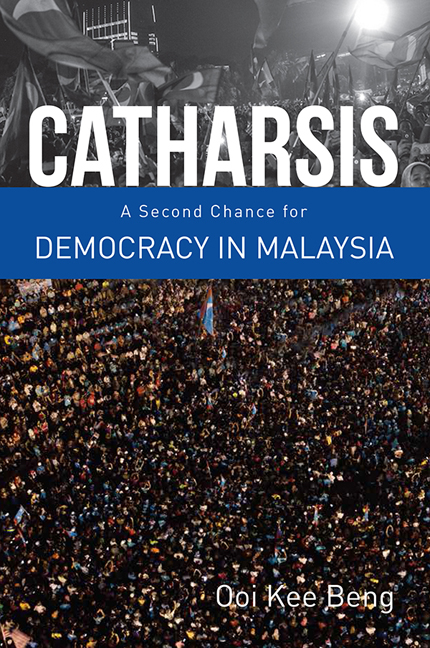Book contents
- Frontmatter
- Contents
- Foreword
- 1 Introduction – Malaysia's Future Is Redeemed
- Before Pakatan Harapan
- Before 9 May 2018
- 12 Racialising the Un-racialisable: What Is the Red Shirt Rally All About?
- 13 One Country's Merdeka Is Another's Damage Control
- 14 Malaysia – Where Politics Must Be Ethnically Inclusive and Exclusive at the Same Time
- 15 Is Malaysia at a Crossroads or in a Quagmire?
- 16 Unity Without Solidarity Sows Disunity
- 17 UMNO and Looking Back at History
- 18 Sarawak Forces Federal Opposition to Do Deep Soul-searching. But Can It?
- 19 By-elections Reveal New Malay Politics
- 20 Interview with Mahathir Mohamad: ‘People Must Be Able to Hold Their Heads Up.’
- 21 Malaysia Has to Start Re-examining Its Histories
- 22 Waves from US Probe into 1MDB May Turn into Tsunami
- 23 Seeking a New Formula to Unite Malaysia's Diversity
- 24 Time for Anwar to Accept Mahathir's Olive Branch?
- 25 Najib, Mahathir and the Timing of Malaysia's Polls
- 26 Excessive Governance Is Not Good Governance
- 27 Why Malaysia's Opposition Will Take to the Streets Again
- 28 Merdeka is About The Individual, Too
- 29 A Battle Between Malay Leaders Over Malaysia's Future
- 30 The Primacy of Political Economy in Asia
- With Mahathir at the Helm
- Beyond 9 May 2018
- About the Author
14 - Malaysia – Where Politics Must Be Ethnically Inclusive and Exclusive at the Same Time
from Before 9 May 2018
Published online by Cambridge University Press: 12 February 2019
- Frontmatter
- Contents
- Foreword
- 1 Introduction – Malaysia's Future Is Redeemed
- Before Pakatan Harapan
- Before 9 May 2018
- 12 Racialising the Un-racialisable: What Is the Red Shirt Rally All About?
- 13 One Country's Merdeka Is Another's Damage Control
- 14 Malaysia – Where Politics Must Be Ethnically Inclusive and Exclusive at the Same Time
- 15 Is Malaysia at a Crossroads or in a Quagmire?
- 16 Unity Without Solidarity Sows Disunity
- 17 UMNO and Looking Back at History
- 18 Sarawak Forces Federal Opposition to Do Deep Soul-searching. But Can It?
- 19 By-elections Reveal New Malay Politics
- 20 Interview with Mahathir Mohamad: ‘People Must Be Able to Hold Their Heads Up.’
- 21 Malaysia Has to Start Re-examining Its Histories
- 22 Waves from US Probe into 1MDB May Turn into Tsunami
- 23 Seeking a New Formula to Unite Malaysia's Diversity
- 24 Time for Anwar to Accept Mahathir's Olive Branch?
- 25 Najib, Mahathir and the Timing of Malaysia's Polls
- 26 Excessive Governance Is Not Good Governance
- 27 Why Malaysia's Opposition Will Take to the Streets Again
- 28 Merdeka is About The Individual, Too
- 29 A Battle Between Malay Leaders Over Malaysia's Future
- 30 The Primacy of Political Economy in Asia
- With Mahathir at the Helm
- Beyond 9 May 2018
- About the Author
Summary
What any Malaysian knows at heart is that the Malay community will always dominate the politics of the country. This means in concrete terms that Malaysia's key leaders will always nominally and in reality be Malay Muslims.
However, the country's population is a very mixed one and from the very beginning, leaders of the Malay community who wish to be remembered as statesmen and respected as nation builders have had to expound the idea that Malay interests do not necessarily contradict national interest or even the interests of other communities.
UMNO's first president famously tried to change the party's name from United Malay National Organisation to United Malayan National Organisation. He realised what most of his followers had not yet realised. Malaysian politics has to be multi-ethnically sensitive.
His successor as UMNO president, Tunku Abdul Rahman Putra, would realise this. Under him, UMNO grew from strength to strength based on the slogan of ‘Merdeka’ rather than ‘Hidup Melayu’; the latter having been the raison d'etre of the Malay party since its founding. More importantly, teaming up with the Malayan Chinese Association in 1952 made his party's agenda more clearly an inclusive one. And with that move, broad support could be gained and Merdeka was gained at an earlier time than expected.
As truly as Malay dominance is an inescapable reality for Malaysia, a central policy direction that is ethnically inclusive is unavoidable for sufficient harmony to be achieved so that its economy can gain the trust of both domestic and international investors, and grow to its full potential.
Ethnic tensions saw riots breaking out in 1969. The Tunku had to retire and his successors put into place powerful constitutional curbs on the freedom of speech in the public sphere and in parliament. Other measures were taken for UMNO to secure a stronger hold on power in its proclaimed role as the champion of Malay collective interests. But before the next general elections could be called, the new prime minister Tun Abdul Razak Hussein had made certain that the ruling coalition would now include as many parties representing as possible. To top it off, he arranged for a much publicised visit by him to China to begin Malaysia's normalisation of ties with the communist giant.
- Type
- Chapter
- Information
- CatharsisA Second Chance for Democracy in Malaysia, pp. 48 - 51Publisher: ISEAS–Yusof Ishak InstitutePrint publication year: 2018

